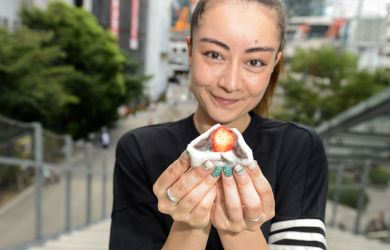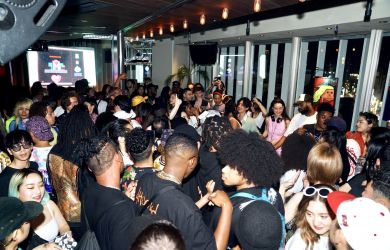
Originally published on metropolis.co.jp on January 2011
 When Bae Yong Joon touched down at Haneda airport last month, it was just like old times. The 38-year-old actor, best known on these shores as the star of 2002 TV series Winter Sonata, was greeted on arrival by over 4,000 fans—many of them old enough to be his mother.
When Bae Yong Joon touched down at Haneda airport last month, it was just like old times. The 38-year-old actor, best known on these shores as the star of 2002 TV series Winter Sonata, was greeted on arrival by over 4,000 fans—many of them old enough to be his mother.
Not too long ago, this was the face of Japan’s hanryu boom: a gaggle of middle-aged and elderly women, susceptible to the charms of soft-focus melodramas and their pretty-boy stars. But the past couple of years have seen Korean pop culture make inroads into demographics that Yon-sama could never reach. Although TV dramas still enjoy a strong following here, it’s now pop music that’s leading the charge, and winning over hordes of younger female fans in the process.
First came Rain (who’s since been distracted by an undistinguished Hollywood career), then Tohoshinki. The quintet, known as TVXQ back in Korea, became the first foreign male group ever to top the Oricon singles charts when “Purple Line” shot to number 1 in January 2008. A string of hits followed, and at the start of 2010 their single “Break Out!” smashed the first-week sales record set by Elton John’s “Candle in the Wind 1997” 12 years earlier, shifting over 250,000 copies in seven days.
Although the group went on hiatus in April due to legal wrangles with their talent agency (more on that later), they’d blazed a path for others to follow. Boy band Bigbang reached number 2 in the charts with their eponymous second album in 2009, going on to play the main stage at last year’s Summer Sonic music festival. 2PM packed out the Ryogoku Kokugikan in early December to promote the domestic release of 01:59PM, while Shinee made their Japan debut on Boxing Day at Yoyogi National Gymnasium, no less.
Still, it’s the current crop of K-pop girl groups who have been hogging the media spotlight lately—and when you’ve got legs like the members of Girls’ Generation, that’s probably understandable. The nine-member unit have taken the country by storm over the past six months, reaching number 2 with their single “Gee” in October, and hopelessly outclassing AKB48 when the two groups appeared together on Fuji TV’s FNS Music Festival last month.
Like many of their peers, Girls’ Generation—known as Shojo Jidai here—had already secured a strong YouTube following prior to making their official Japan debut. Their J-pop incarnation has been given more than just a linguistic makeover, too: their image has been tailored to appeal to teenage and 20-something women, in contrast to their predominantly male audience back in Korea.
Five-piece Kara have also fared well: their debut J-pop album, Girls Talk, entered the charts at number 2 in November, selling 107,000 copies in its first week of release. Expect to see plenty more of them during 2011, as well as 4Minute and 2NE1—who postponed a planned December debut because, by their label’s admission, they weren’t ready to make a proper go at it.
It’s too early to say yet whether the current K-pop boom will end with a Bigbang or a whimper, but the signs are encouraging, not least the migration of Korean pop from the world music ghetto to the main floors of many record stores. More worrying are the stories of indentured pop servitude that frequently emerge from across the water.
Tohoshinki will be returning as a duo this year, after three of the original members filed a lawsuit against talent agency SM Entertainment, questioning the fairness of their contracts. SM pulls the strings of many top K-pop acts, while enjoying a close relationship with Japanese heavyweight Avex Trax. It makes Johnny’s Jimusho look almost benign in comparison.
Until the end of last year, SM’s aspiring K-pop stars were made to sign 13-year contracts and pay double the amount of their predicted earnings if they terminated these prematurely. It took an official rebuke by the Fair Trade Commission in December to change this—although the company is currently appealing the decision, and has publicly lashed out at any artists who dared question its authority.
As for Tohoshinki’s three ex-members, they’ve since regrouped as JYJ and signed with a different agency—one whose president is currently under investigation for alleged links to organized crime. The names may change, but the song remains the same.







